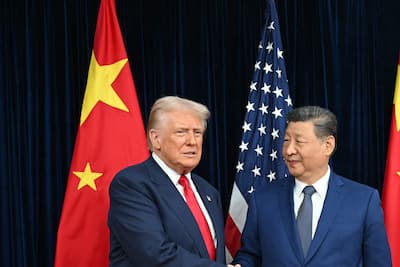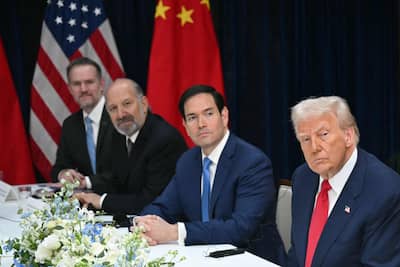Donald Trump announced Thursday that he had reached an agreement on rare earths, soybeans and some tariffs during a meeting in South Korea with Chinese President Xi Jinping, which he called a “great success.”
• Also read: Trump orders US nuclear weapons tests
• Also read: South Korea and the United States have an extensive trade agreement.
US and Chinese partners were watching the key meeting closely, hoping for a truce as the two countries wage a trade war that is shaking the global economy.
The American president added that he would visit China in April next year, while Beijing has not yet commented on the outcome of the meeting.
Donald Trump announced a one-year renewable supply agreement for rare earth elements, a critical material over which China has a virtual monopoly and over which Beijing's restrictions on its supply have angered him.
“The rare earth deal is now done, and it affects the whole world,” Trump told reporters aboard Air Force One.
Washington also agreed to reduce from 20% to 10% tariffs that were imposed on China in response to trafficking in fentanyl, a drug whose components are manufactured in China and is responsible for thousands of deaths in the United States, he said.
The American president further assured that China will purchase “significant quantities” of soybeans and other agricultural products from the United States, a statement that should reassure American farmers, among whom he has many voters.
During those interviews, Mr. Trump said, “Taiwan was never mentioned.” Beijing claims sovereignty over the island, of which Washington remains its most influential proponent and which observers say could bear the brunt of negotiations.
On the other hand, regarding Ukraine, “we've been talking about this for a long time, and we're both going to work together to see if we can get something done,” Donald Trump said.
After this 1 hour 40 minute interview, he left South Korea for Washington. The leaders of the world's two largest economies, who had not seen each other for six years, parted ways without making a joint statement.
On arrival, Xi Jinping said it was “pleased to see again” Donald Trump, who described his counterpart as a “formidable negotiator” as he posed for photographs in the austere building of Busan Airport (southeast).
“China and the United States can jointly fulfill their responsibilities as great powers and work together to implement more ambitious and concrete projects for the benefit of our two countries and the world,” Xi Jinping said.
Nuclear testing
Shortly before the meeting, the American president announced the immediate resumption of nuclear weapons testing.
He ordered his Defense Department to “begin testing” US nuclear weapons after his Russian counterpart Vladimir Putin challenged him with a test of an underwater drone capable of carrying nuclear weapons.
“The United States has more nuclear weapons than any other country,” he said on his social network Pravda. “Russia is in second place, and China is a distant third, but in five years it will catch up.”
MM. Trump and Xi know each other well: They met five times during the Republicans' first term, but their last meeting dates back to 2019.
Since then, the rivalry between the two superpowers has only intensified, most notably with Donald Trump, who returned to power in January, launching a radical protectionist offensive in the name of his “America First” ideology.
Rare earths
This summit comes after several particularly eventful weeks.
On September 19, Donald Trump announced an upcoming meeting with his Chinese counterpart after a “very productive” telephone conversation.
Then the topics of friction piled up until the one that sent the American president spiraling out of control: Beijing's Oct. 9 decision to restrict exports of rare earth metals, risking jeopardizing the White House tenant's major re-industrialization program.
Condemning the “hostile” maneuver, Trump threatened to impose huge tariffs and abandon the meeting.
“Reducing Tensions”
A trade agreement should not resolve substantive disputes, which are economic but also strategic.
Donald Trump is skeptical of his Chinese counterpart's diplomatic maneuvers to rally major developing countries and chafed by ties between China and Russia.
But he also had a political interest in announcing one of these “deals” he likes while he's stuck at home in a protracted budget crisis.
The meeting with Xi Jinping ends an Asian tour on a much more sober note, during which he was greeted with respect in Malaysia, Japan and South Korea, with lavish gifts and promises of huge investment in the United States.
Donald Trump said Thursday he was too “busy” while traveling to meet North Korean leader Kim Jong Un, but said he may return.










